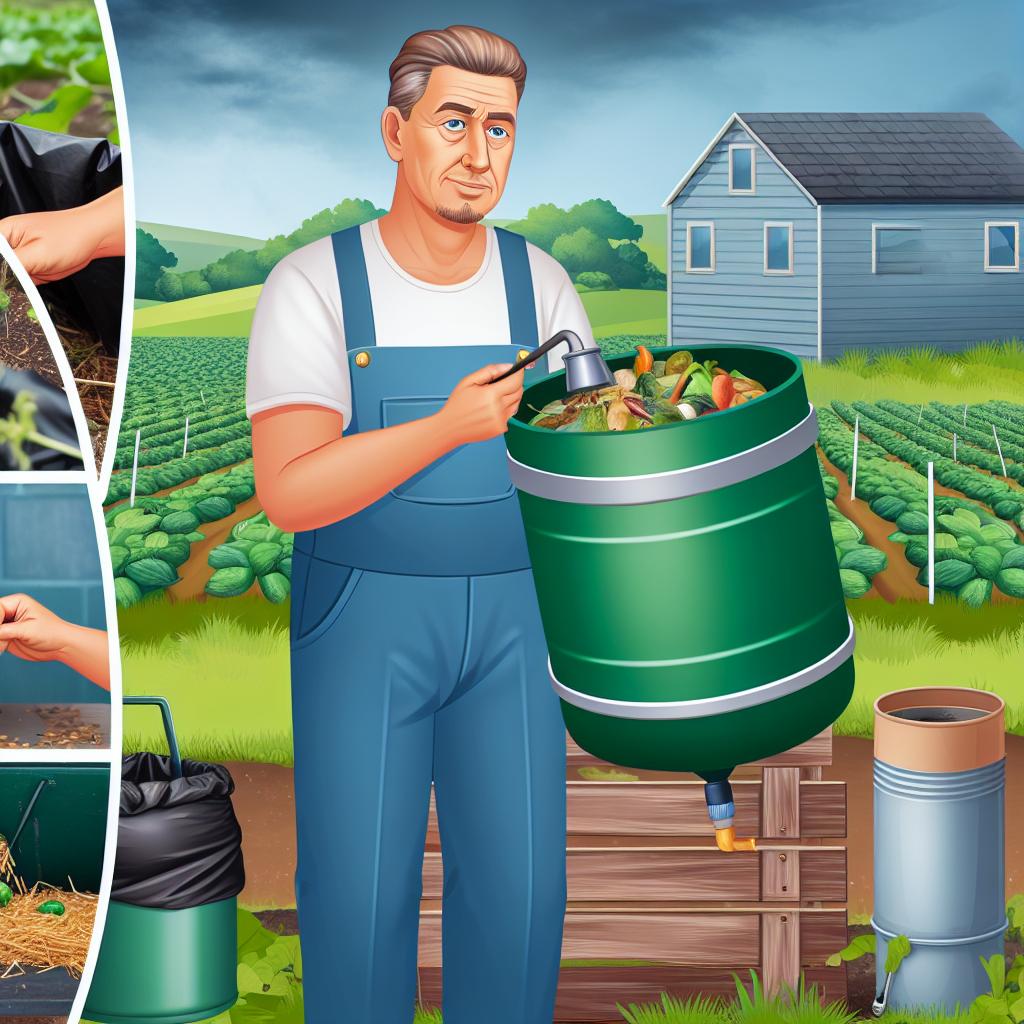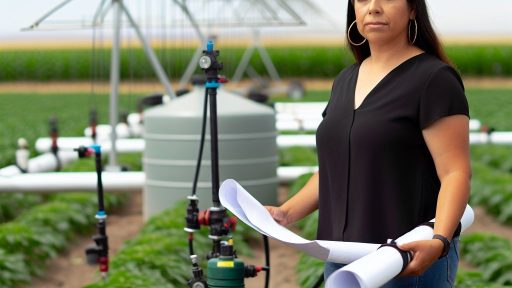Introduction to Waste Reduction in Farming Operations
Waste reduction is a vital aspect of modern farming.
It plays a significant role in sustainable agriculture.
This approach minimizes environmental impact and enhances efficiency.
The Importance of Waste Reduction
Every year, farms generate significant amounts of waste.
This waste includes organic materials, plastic, and chemicals.
Reducing waste improves farm profitability and sustainability.
Furthermore, it fosters better relations with the local community.
Current Waste Issues in Farming
Farmers face various challenges regarding waste production.
These challenges include inadequate composting systems.
Additionally, improper waste disposal practices contribute to the problem.
Many farms also struggle with excess packaging materials.
Strategies for Waste Reduction
Farmers can adopt multiple strategies to reduce waste.
Implementing recycling programs is essential.
Using biodegradable materials can also significantly lower waste levels.
Moreover, composting organic waste enriches soil and reduces landfill contributions.
Transform Your Agribusiness
Unlock your farm's potential with expert advice tailored to your needs. Get actionable steps that drive real results.
Get StartedTechnology and Innovation
New technologies contribute to waste reduction in farming.
For instance, precision agriculture optimizes resource usage.
Moreover, data analytics can identify waste patterns.
Using smart sensors helps farmers monitor and adjust practices effectively.
Collaboration and Education
Farmers should engage with local organizations to improve practices.
Educational workshops can raise awareness about waste reduction.
Collaboration with universities drives research on sustainable practices.
Community engagement fosters a culture of sustainability.
Benefits of Reducing Waste in Agriculture
Enhancing Environmental Sustainability
Reducing waste in farming operations significantly enhances environmental sustainability.
This practice minimizes pollution and conserves natural resources.
Furthermore, less waste leads to reduced greenhouse gas emissions.
Ultimately, these actions contribute to healthier ecosystems.
Improving Economic Efficiency
Waste reduction directly improves economic efficiency for farmers.
When waste decreases, farmers save on material and disposal costs.
Additionally, efficient use of resources can boost crop yields.
Consequently, farmers experience increased profitability.
Promoting Food Security
Reducing agricultural waste promotes global food security.
By maximizing production efficiency, farmers can feed more people.
Moreover, minimizing waste leads to more sustainable food systems.
This directly supports communities facing food scarcity issues.
Encouraging Innovation and Practices
Emphasizing waste reduction encourages innovation within the farming sector.
Farmers explore new technologies and techniques to minimize waste.
For instance, precision farming offers targeted application methods.
Such innovations lead to improved resource management.
Showcase Your Farming Business
Publish your professional farming services profile on our blog for a one-time fee of $200 and reach a dedicated audience of farmers and agribusiness owners.
Publish Your ProfileBuilding Stronger Community Relations
Waste reduction initiatives build stronger relationships with local communities.
Farmers engaging in these practices gain public trust and support.
Additionally, community education on these efforts fosters involvement.
Ultimately, this creates a collaborative atmosphere for sustainable agriculture.
Common Types of Waste in Farming
Organic Waste
Organic waste includes crop residues, manure, and food waste.
This type of waste often decomposes and can be recycled.
Farmers can compost organic materials to create nutrient-rich soil amendments.
Efficient management of organic waste enhances soil health and reduces landfill contributions.
Plastic Waste
Plastic waste primarily comes from packaging materials and greenhouse coverings.
Many farmers use plastic for row covers, mulch, and containers.
Unfortunately, plastic waste creates significant environmental concerns.
Implementing recycling programs can help farmers reduce plastic waste.
Additionally, using biodegradable alternatives can further minimize plastic use.
Chemical Waste
Chemical waste arises from pesticides, fertilizers, and cleaning agents.
Improper disposal of these chemicals can harm ecosystems.
Farmers should follow guidelines for safe chemical use and disposal.
Employing integrated pest management reduces reliance on chemical inputs.
Moreover, training staff on proper chemical handling promotes safety.
Learn More: Implementing Agritourism to Diversify Farm Income
Innovative Waste Reduction Technologies and Practices
Embracing Precision Agriculture
Precision agriculture harnesses technology to enhance farming efficiency.
This approach minimizes waste through targeted resource application.
Farmers use GPS and data analytics to optimize inputs.
For example, sensors provide real-time feedback on soil conditions.
As a result, farmers can adjust fertilizers and water usage precisely.
Utilizing Composting Techniques
Composting transforms organic waste into valuable soil amendments.
This process reduces the amount of waste sent to landfills.
Farmers create compost from crop residues and livestock manure.
Subsequently, they apply it back to their fields to improve soil health.
This practice also decreases the need for chemical fertilizers.
Implementing Cover Cropping
Cover crops protect the soil during off-seasons.
They prevent erosion and improve soil fertility while reducing weed growth.
Farmers often select legumes to enhance nitrogen levels in the soil.
This approach leads to lower fertilizer use and increased crop yield.
Exploring Agroforestry Practices
Agroforestry integrates trees into agricultural systems for multiple benefits.
This method enhances biodiversity while reducing soil erosion.
It also contributes to carbon sequestration and waste reduction.
Farmers often find additional income from timber or fruit production.
Adopting Biogas Technology
Biogas technology converts organic waste into renewable energy.
This process reduces methane emissions from decomposing waste.
Farmers can produce energy for their operations.
Showcase Your Farming Business
Publish your professional farming services profile on our blog for a one-time fee of $200 and reach a dedicated audience of farmers and agribusiness owners.
Publish Your ProfileAdditionally, the leftover digestate serves as an organic fertilizer.
Ultimately, this practice turns waste into a resource.
Engaging in Sustainable Packaging Solutions
Sustainable packaging reduces waste generated from farming practices.
Farmers can choose biodegradable or recyclable materials for products.
Such practices minimize the environmental impact of waste.
Furthermore, consumer awareness drives demand for sustainable products.
This shift encourages farmers to innovate and adapt their practices.
Collaborating to Reduce Food Waste
Collaboration across the supply chain minimizes food waste effectively.
Farmers can partner with local charities to donate surplus food.
They may also participate in local farmer’s markets for fresh produce.
This approach builds community connections while reducing waste.
As such, collaboration serves both social and environmental goals.
Learn More: Building Resilient Supply Chains for the Farming Industry
Implementing Crop Rotation and Cover Cropping for Waste Reduction
The Benefits of Crop Rotation
Crop rotation enhances soil health and structure.
It also prevents the depletion of essential nutrients.
Furthermore, rotating crops disrupts pest and disease cycles.
This method reduces the need for chemical fertilizers and pesticides.
Basic Principles of Crop Rotation
Establish a rotation plan based on crop families.
Incorporate legumes to fix nitrogen in the soil.
Follow with crops that benefit from the available nutrients.
Maintain diversity to boost resilience against pests.
Cover Cropping Explained
Cover cropping involves planting specific crops during off-seasons.
These crops protect the soil from erosion and nutrient loss.
They also improve soil organic matter and microbial health.
Additionally, cover crops can assist in weed suppression.
Choosing the Right Cover Crops
Select cover crops suited to your local climate.
Consider varieties like clover, rye, or vetch.
Ensure these crops can thrive in your field conditions.
Evaluate their potential benefits for your successive cash crops.
Best Practices for Implementation
Plan rotations and cover crop schedules for your growing season.
Communicate the strategies with farm workers to ensure understanding.
Monitor soil health through testing before and after implementations.
Adjust practices based on observed results and soil feedback.
Discover More: Integrating Supply Chain Optimization into Farm Operations
Recycling and Reusing Materials on the Farm
Importance of Recycling in Agriculture
Recycling significantly minimizes waste in farming operations.
It promotes sustainability by reducing the use of raw materials.
Farmers can save money through effective recycling practices.
Additionally, recycling helps in conserving energy.
It fosters a circular economy within the agricultural sector.
Common Materials for Recycling
Farmers can recycle plastic containers used for fertilizers.
Showcase Your Farming Business
Publish your professional farming services profile on our blog for a one-time fee of $200 and reach a dedicated audience of farmers and agribusiness owners.
Publish Your ProfileMetal scraps from various farm machinery can also be reused.
Papers and cardboard from packaging make excellent compost.
Moreover, wood pallets are ideal for various farm applications.
Recycling these materials strengthens the ecosystem on the farm.
Strategies for Implementing Reuse Practices
Establish a dedicated recycling area on the farm.
Train staff on how to sort and handle recyclable materials.
Encourage farmers to collaborate with local recycling centers.
Use social media to share successes and best practices.
Conduct regular audits to identify recycling opportunities.
Benefits of Reusing Materials
Reusing materials reduces the need for new resources.
It lowers operational costs for farming businesses.
Moreover, reusing items can lead to innovative farming solutions.
This practice promotes environmental stewardship among farmers.
Ultimately, it contributes to a healthier planet.
Case Studies of Successful Recycling Initiatives
Green Valley Farms implemented a rainwater harvesting system.
This system utilizes recycled materials to capture and store water.
Sunny Acres Winery created compost from vineyard waste.
They use compost to enrich soil, improving crop yields.
Many farmers report increased efficiency through these initiatives.
Uncover the Details: Renewable Energy Solutions In Sustainable Farming

The Role of Composting in Managing Organic Waste
Understanding Composting
Composting converts organic waste into valuable fertilizer.
This process enhances soil health and fertility.
Farmers can utilize compost to enrich the soil.
Moreover, composting reduces the volume of waste on farms.
Benefits of Composting
One major benefit is enhanced soil structure.
Healthy soil retains moisture and supports plant growth.
Additionally, compost improves nutrient availability.
This results in better crop yields and quality.
Composting Techniques
Several composting methods exist for farm operations.
- Pit composting is simple and cost-effective.
- Heap composting allows for larger batches.
- Tumbler composters speed up the composting process.
Choosing the right method depends on available resources.
Implementing Composting on Farms
Start by collecting organic waste from farming activities.
This includes crop residues, manure, and kitchen scraps.
Ensure the waste is mixed properly to aid decomposition.
Regular turning of the compost pile accelerates the process.
Challenges in Composting
Composting may face some challenges in farming.
One challenge is odor control during decomposition.
Wet or poorly aerated compost can create unpleasant smells.
Moreover, pests can be attracted to compost piles.
Addressing Challenges
Farmers can manage odor by maintaining proper moisture levels.
Proper aeration will help in keeping the compost pile balanced.
Showcase Your Farming Business
Publish your professional farming services profile on our blog for a one-time fee of $200 and reach a dedicated audience of farmers and agribusiness owners.
Publish Your ProfileUsing covered compost bins can deter pests effectively.
Composting as a Sustainable Practice
Composting offers immense benefits for farm waste management.
It contributes to sustainability and enhances agricultural productivity.
By overcoming challenges, farmers can reap significant rewards.
Policy and Regulation Impacts on Waste Reduction in Agriculture
Current Legislation and Standards
Various regulations influence waste management in farming operations.
For instance, the Environmental Protection Agency enforces guidelines.
These guidelines help farmers minimize waste and promote recycling.
Additionally, state laws offer incentives for sustainable practices.
Farmers must comply with these regulations to maintain operations.
Government Programs and Initiatives
Programs aimed at waste reduction play a crucial role in agriculture.
Governments often provide funding for innovative waste management technologies.
For example, initiatives like the Conservation Stewardship Program encourage best practices.
These programs educate farmers on effective waste reduction strategies.
Consequently, farmers can improve their sustainability while maintaining profitability.
Impact of Global Environmental Agreements
International agreements also shape agricultural waste management policies.
Agreements like the Paris Accord promote eco-friendly farming practices.
Countries commit to reduce greenhouse gas emissions and agricultural waste.
As a result, farmers are encouraged to adopt sustainable practices.
These global guidelines influence national policies and local regulations.
Challenges in Compliance and Implementation
Despite supportive policies, farmers face significant challenges.
Regulatory complexity can discourage farmers from adopting new methods.
Small farms often lack resources to comply with stringent regulations.
Moreover, inconsistent enforcement can create confusion among farmers.
As such, addressing these challenges is vital for effective waste reduction.
Future Directions and Innovations
The future of waste reduction in farming relies on innovation.
Policies must evolve to incorporate new technologies and methods.
For instance, precision agriculture can optimize resource use.
Additionally, research into biodegradable materials offers promising solutions.
Collaborative efforts between farmers and policymakers are essential for progress.
Case Studies of Successful Waste Reduction in Farming Operations
Organic Farming Initiatives
Sunny Acres Farm implemented organic methods to reduce chemical waste.
The farm grows a variety of crops without synthetic fertilizers.
By utilizing compost, they recycle food scraps into rich soil amendments.
This process not only reduces waste but also enhances soil fertility.
Innovative Water Management
Green Fields Agriculture focuses on efficient water usage to minimize waste.
They installed drip irrigation systems, which deliver water directly to plants.
This approach saves significant amounts of water compared to traditional methods.
Additionally, excess water is collected and reused for irrigation cycles.
Collaboration with Local Food Banks
Harvest Hope Farms partners with local food banks to reduce food waste.
They donate surplus produce, ensuring it reaches those in need.
This initiative prevents food from being discarded and supports the community.
Showcase Your Farming Business
Publish your professional farming services profile on our blog for a one-time fee of $200 and reach a dedicated audience of farmers and agribusiness owners.
Publish Your ProfileMoreover, it promotes a culture of sharing among local farmers.
Utilization of Technology
AgriTech Solutions leverages technology for waste monitoring and management.
Their software tracks waste generation in real-time, identifying areas for improvement.
By analyzing data, farmers can adjust practices to minimize excess.
This proactive approach leads to a significant reduction in waste generation.
Successful Crop Rotation Practices
Willow Creek Farm adopted crop rotation to enhance resource efficiency.
This method reduces the need for chemical fertilizers and herbicides.
As a result, their fields maintain nutrient balance and reduce waste.
Crop rotation also helps control pest populations naturally.
Community Education Programs
Farmers’ Cooperative of Springfield runs educational workshops on waste reduction.
These programs teach local farmers sustainable practices and methods.
By fostering a community of environmentally conscious farmers, they minimize waste.
The initiative encourages sharing of resources and ideas among participants.




